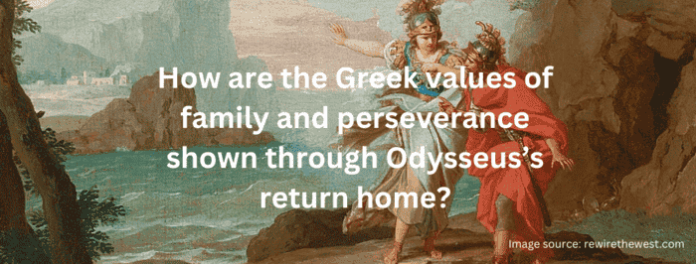If you’re wondering, “How are the Greek values of family and perseverance shown through Odysseus’s return home?” you’re not alone. I will answer this question below.
The short answer:
The Greek values of family and perseverance are portrayed in Homer’s Odyssey through the actions of its main characters: Odysseus, his wife Penelope, and their son Telemachus. Despite the long distance and years of separation, Odysseus, his wife, and his son uphold their bond as a family.
The obstacles and challenges that Odysseus faces throughout the journey home exemplify the Greek values of family and show his persistence in reuniting with his loved ones.
Explanation of the Greek values of family and perseverance shown through Odysseus’s return home
Many pieces of ancient Greek literature are rich with Greek history, philosophy, mythology and culture. One of the best examples of this is Homer’s Odyssey. The Odyssey, on the other hand, tells of Odysseus’ long and perilous journey home after the Trojan War. Aside from tales of adventure and mythical creatures, The Odyssey also exemplifies the Greek values of family and perseverance through its characters and their reactions to the situations they are dealing with.
The poet Homer depicts Odysseus as a husband to Penelope and a father to Telemachus as well as the King of Ithaca. Odysseus has been away for ten years fighting alongside other kings in the Trojan War. The Odyssey begins after the Trojan War as Odysseus sails back home. Little does he know that this journey home would take him ten more years because of the many obstacles the gods sent him along the way. Odysseus, being an intelligent man, is able to overcome all of these obstacles, with much cunning and perseverance. One example of this is when he and his men faced Polyphemus, a Cyclops (one-eyed giant). Where many would probably turn into despair, Odysseus persisted and used his talents of quick thinking in the face of extreme danger. In Book IX of The Odyssey, Odysseus and his men are trapped in Polyphemus’ cave and he starts devouring Odysseus’ men. In order to stop him from eating his men, he offers Polyphemus a drink of wine and strikes up a conversation. When asked for his name, Odysseus said, “My name is Nobody: mother, father, and friends, everybody calls me Nobody” (Homer, Book IX). As the Cyclops gets drunk and falls asleep, Odysseus makes a wooden stake and strikes the eye of Polyphemus. As he cries out in pain, shouting, “Nobody hurt me”, Polyphemus is unaided then blinded. They successfully escape by tying themselves on the bellies of sheep so they would not be noticed or felt by the blind giant. This event shows his patience, perseverance and endurance in planning everything perfectly to be able to escape Polyphemus.
As he journeys home, Odysseus shows his longing to be with his wife and son. This homecoming is filled with obstacles and temptations that test Odysseus’ devotion to his family. One of the temptations that he faces is with the nymph, Calypso. In Book V, Calypso lures Odysseus and his men to her island of Calypso. They, in fact, stay there for seven years. Calypso promises him immortality and eternal youth if Odysseus chooses to stay as her consort. He respectfully declines, and says, “Yet, even so, I wish, and every day I long, to go back home, to see the day of my return” (Homer, Book V) This feeling is also reciprocated by his wife, Penelope, as she faithfully waits for her husband’s return. In the two decades of waiting, numerous suitors have attempted to win her heart. Penelope remains steadfast in her love, believing that her husband is alive and will return to Ithaca. Their son, Telemachus, also firmly believes that his father is alive. In spite of not having Odysseus around to watch him grow into a young man, his loyalty to his father is shown as he helps him get rid of Penelope’s suitors in Book XXII.
Homer’s Odyssey reflects many other Greek values that withstand time. The Greek values discussed here are seen in the characters and their actions. In the end, Homer aims to depict heroes as ideal humans who have love for his family, who can withstand trials and temptations, and who will persevere to win at all costs.
References:
https://www.sparknotes.com/lit/odyssey/full-text/book-i/
https://www.owleyes.org/text/odyssey/read/book-xxi#root-219195-4

